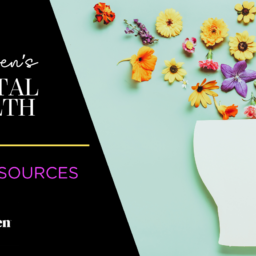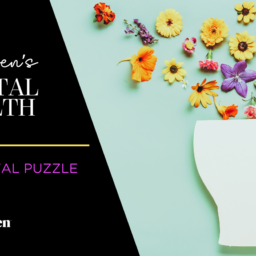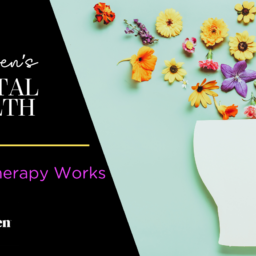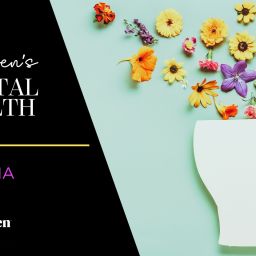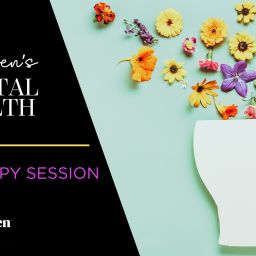
Created as part of our Guest Editor Series with Girl Coalition of Indiana (Girl Co.) and Women’s Fund of Central Indiana.
In an era that celebrates self-care Sundays and wellness weeks, where do we find the time and space to truly rest, reflect, and recharge? Even these moments of supposed relaxation have become commodified and measured by their productivity. For many women and girls, rest and grace are fleeting, if not entirely elusive.
The 2024 Indiana Girl Report from the Girl Coalition of Indiana (Girl Co.), in partnership with Girl Scouts and Indiana Youth Institute, and the State of Women in Central Indiana Report by the Women’s Fund of Central Indiana, in partnership with the Polis Center at Indiana University Indianapolis, highlights mental health as a critical challenge facing Hoosier women and girls.
 Girls are struggling.
Girls are struggling.
The Indiana Girl Report revealed that 47 percent of girls in 7th through 12th grade felt sad or hopeless for more than two weeks in a row and stopped doing usual activities. More than 23 percent have seriously considered attempting suicide, and nearly 18 percent have made a plan to end their lives. A call-out in the report underscores that too many girls facing mental distress feel they have nowhere to turn. “Many young girls still feel a heavy burden of silence. They worry that speaking out about their struggles might lead to judgement or alienation from their peers and family” (Girls Speak Out About Mental Health, 2020).
Our culture constantly pushes us to distill our lives into digestible sound bites for public consumption. External validation is impossible to avoid, whether it’s perfecting a 30-second personal brand pitch for a job interview or creating a flawless “day in the life” vlog. These relentless pressures—when left unchecked and unsupported—can magnify underlying mental health struggles, creating a heightened effect that makes it harder for girls and women to manage their well-being.
Women are struggling too.
Women’s mental health has emerged as a critical concern, with alarming trends in depression, frequent mental distress, and substance abuse disorders. Nearly 30 percent of Central Indiana women reported experiencing depression, with the highest rates among women 18 to 34, the State of Women in Central Indiana Report revealed. In fact, data reveals that 1 in every 3 women aged 18 and older suffers from depressive disorders, compared with 1 in 8 men in the same age group. Women in Central Indiana consistently have higher rates of emergency interventions for mental health crises compared to men.
Society instills in women the expectation to be productive, polished, and poised constantly from childhood to adulthood. Girls and women are told to pack their schedules with extracurriculars, homework, work obligations, and carve out time for personal development—all while being reminded where we “should” be in five years. The pressure builds as we grow, transitioning from girlhood to womanhood, where the weight of pursuing passions, starting families, building generational wealth, and maintaining a balanced life often seems impossible.
“Women in Central Indiana consistently have higher rates of emergency interventions for mental health crises compared to men.”
A 2019 study by Mental Health America estimated that Indiana’s untreated mental illness costs the state approximately $42 billion annually. Even more alarming, fewer than half of individuals with mental health conditions receive the treatment they need. This gap in access to mental health care disproportionately affects vulnerable populations—especially women and girls — who face significant barriers to receiving trauma-informed and culturally competent care.
 Women’s Fund’s 2024 Night of 100 Women event—a gathering of diverse women from across Central Indiana—centered on mental health. Through activities and moderated table discussions, women highlighted barriers to good mental health. Thirty percent cited money as a barrier to accessing mental healthcare. Over 20 percent noted a lack of accessible services and long wait times. And 14 percent mentioned persistent cultural and societal stigma around mental health issues. This is particularly true for communities of color. Women of color, queer women, and immigrant women underscored the lack of culturally competent providers.
Women’s Fund’s 2024 Night of 100 Women event—a gathering of diverse women from across Central Indiana—centered on mental health. Through activities and moderated table discussions, women highlighted barriers to good mental health. Thirty percent cited money as a barrier to accessing mental healthcare. Over 20 percent noted a lack of accessible services and long wait times. And 14 percent mentioned persistent cultural and societal stigma around mental health issues. This is particularly true for communities of color. Women of color, queer women, and immigrant women underscored the lack of culturally competent providers.
Post-2020, these barriers only intensified. The pandemic took a heavy toll on mental health, and for those already struggling to access services, the challenges became even more insurmountable. A 2020 report from Indiana University revealed a worsening mental health landscape, especially in trauma counseling services, which were already overwhelmed. For girls and women, navigating these obstacles has become a near-constant struggle.
“For women in Central Indiana, you have a pandemic and then carrying our communities or kids or families through that, the assaults on reproductive justice—the intersectionality of all of these things where women have to show up. Like, you don’t get to set the balls down.”
The lack of trauma-informed, culturally competent mental health care for women makes support and emotional recovery during hard times more challenging. An anonymous contributor to the State of Women in Central Indiana Report said, “Around COVID, folks started talking about allostatic load—the cumulative stress that the public was experiencing around the pandemic. For women in Central Indiana, you have a pandemic and then carrying our communities or kids or families through that, the assaults on reproductive justice—the intersectionality of all of these things where women have to show up. Like, you don’t get to set the balls down.”
The numbers paint a grim picture, but beyond the statistics are the lived experiences of the girls and women in our communities. Cyberbullying, sexual harassment and violence, inaccessible basic needs, and societal pressure—these issues don’t exist in a vacuum. They compound over time, creating a crushing weight of expectations and emotional trauma. For girls, in particular, the intersection of adolescence and the digital age has created new vulnerabilities. Social media serves as both a haven and a hazard—a place where people can find connection and validation, but also where comparison, bullying, and feelings of inadequacy thrive.
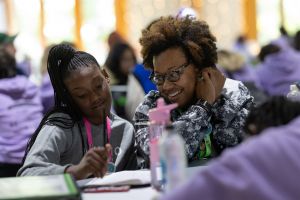 What can we do about it?
What can we do about it?
How can we support girls during these challenges? How do we solve problems before they become lifelong struggles that persist into adulthood? The solution begins with listening—not just to the loudest voices, but to the quiet, often overlooked ones. We need to truly hear the concerns of both girls and women, allowing them the space to articulate their struggles and fears. Finding actual solutions is only possible under those circumstances.
During Girl Co.’s innovation cycle, which also informed the 2024 Indiana Girl Report, they hosted 74 community listening sessions across the state. These sessions revealed a troubling but consistent truth: girls and their caregivers are desperate for more mental health support. One high school girl in Central Indiana shared, “I still get stressed and sad, and it pulls me down… suicide rates have gone up significantly.” Access to mental health services provides layers of support and prevention. One high schooler from Southern Indiana found solace and safety in her family, stating, “I would not have survived if it hadn’t been for my family supporting me.” However, not all girls are as fortunate. Not everyone has a stable, supportive home environment. For these girls, access to mental health services isn’t just important—it’s critical. Safety, stability, and mental health are deeply interconnected. A lack of access to one weakens the others, leaving girls vulnerable to emotional and psychological harm.
The internet ambiguity makes it crucial to address the root causes of issues faced by girls, such as impersonation and cyberbullying. The internet frequently serves as a platform for projecting repressed emotions onto others, perpetuating cycles of bullying and emotional harm. Addressing unacceptable behavior is not enough—we need to provide support systems that unearth the underlying emotional turmoil that leads to it.
During one of the Girl Co.’s listening sessions, a caregiver in Southern Indiana emphasized the importance of including caregivers and parents in anti-bullying programs “More […] programs that also include parents and caretakers. Sometimes the bullying comes from the home, and that is what the child is used to, so they don’t know any better. If you can talk to the parents [and caretakers] about problematic behavior, this could help stop bullying”.
The bottom line is that with the right mental health support, we can break these cycles and create environments where empathy and understanding replace hostility and pain. As highlighted by C.L. Nixon in a 2017 study published in Adolescent Health, Medicine and Therapeutics, the effects of cyberbullying can ripple outwards, affecting not only immediate mental well-being but also long-term health outcomes. Without the necessary mental health resources in place, many girls internalize their struggles, bottling up their pain until it becomes too much to bear. And with adult responsibility and without adequate access to mental healthcare and learned coping mechanisms, struggling girls can become beleaguered women.
the urgent need for a systemic overhaul
Both the State of Women in Central Indiana Report and the Indiana Girl Report stress the urgent need for a systemic overhaul in how we approach mental health for women and girls. It’s not enough to acknowledge the problem—we need actionable solutions that prioritize mental health as a foundational aspect of well-being. Empathetic solutions come from listening and understanding. The Indiana Girl Report and the State of Women in Central Indiana Report both highlight a troubling reality: the mental health crisis is real, and it’s impacting the majority of girls and women across Indiana. Yet, there are significant barriers to seeking help, especially in a society that still stigmatizes mental health conversations.
 To help girls thrive, Girl Co.’s Indiana Girl Report provides clear, actionable steps each person can take. Caregivers and parents must create safe, open spaces for children to share their feelings, and help establish healthy technology habits. Girls can find empowerment through volunteering and problem-solving in their communities. Program providers should offer trauma-informed, culturally responsive spaces for girls to discuss sensitive issues safely. Community members can support female leadership by mentoring girls and connecting them with local role models. Policymakers, too, must engage with communities to address barriers to mental health care and create policies that support the overall well-being of girls across Indiana.
To help girls thrive, Girl Co.’s Indiana Girl Report provides clear, actionable steps each person can take. Caregivers and parents must create safe, open spaces for children to share their feelings, and help establish healthy technology habits. Girls can find empowerment through volunteering and problem-solving in their communities. Program providers should offer trauma-informed, culturally responsive spaces for girls to discuss sensitive issues safely. Community members can support female leadership by mentoring girls and connecting them with local role models. Policymakers, too, must engage with communities to address barriers to mental health care and create policies that support the overall well-being of girls across Indiana.
The State of Women in Central Indiana Report from Women’s Fund further illuminates that the mental health of women in Central Indiana is at a critical juncture. Rising rates of depression, frequent mental distress, and substance use disorders require immediate attention. To better support women’s mental well-being, gender-responsive policies must expand access to care, address socioeconomic disparities, and enhance crisis response systems. Prioritizing such actions can improve mental health outcomes for women, ensuring a more vibrant future for all.
By listening and responding to girls’ and women’s needs, we can support them effectively. Together, we can create a future where we don’t sacrifice well-being for societal expectations. Both reports make clear that the time for action is now. The struggles faced by girls today are shaping the future of women in our communities. If we don’t listen, if we don’t act, we risk letting these challenges persist across generations. But with empathy, resources, and a commitment to creating genuine change, we can support girls and women in living their fullest, healthiest lives.
SUPPORT LOCAL JOURNALISM
All of our content—including this article—is entirely free. However, we’d love it if you would please consider supporting our journalism with an Indy Maven Membership.














